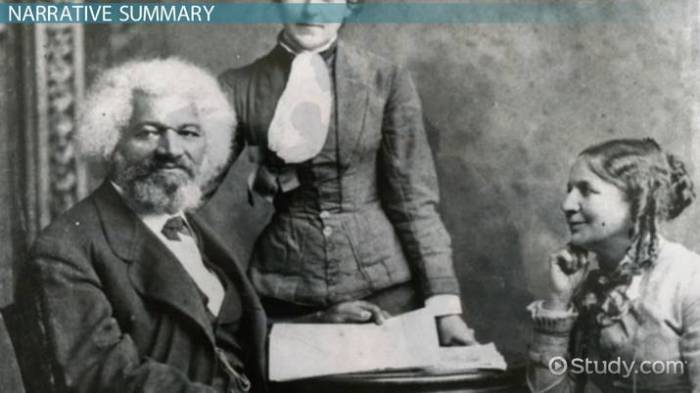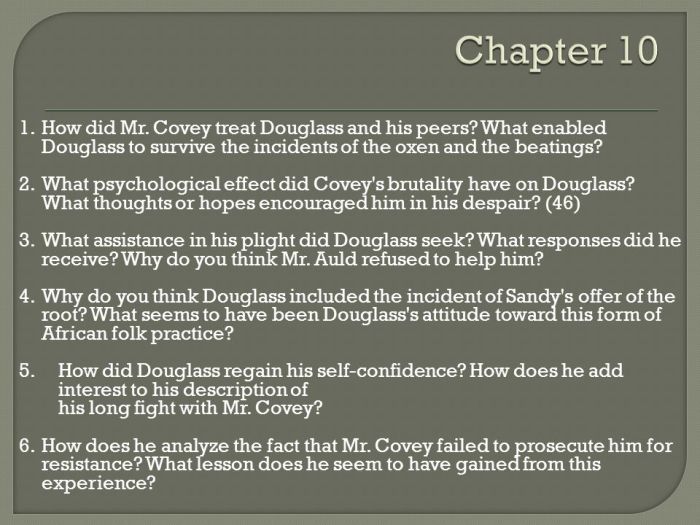Frederick douglass chapter 11 summary – In Frederick Douglass’s Chapter 11, we delve into the pivotal experiences that shaped his life and activism. Douglass’s childhood hardships, the transformative power of literacy, and his unwavering fight for racial equality are examined in this compelling chapter.
Douglass’s early life was marked by the brutality of slavery, but his acquisition of literacy became a beacon of hope. Through reading and writing, he gained knowledge and a voice, empowering him to expose the horrors of slavery and advocate for freedom.
Introduction
Chapter 11 of Frederick Douglass’s autobiography, “Narrative of the Life of Frederick Douglass, an American Slave,” holds significant importance as it recounts his daring escape from slavery in 1845. This chapter is a pivotal moment in Douglass’s life, marking his transition from bondage to freedom.
Prior to the events of Chapter 11, Douglass had spent over two decades as a slave in Maryland. He had endured harsh treatment and witnessed the brutality of slavery firsthand. Despite the oppressive conditions, Douglass had maintained a strong desire for freedom and had secretly planned his escape for years.
Escape from Slavery
In Chapter 11, Douglass meticulously describes the intricate plan he devised to escape from slavery. With the help of free black sailors and abolitionists, he disguised himself as a sailor and boarded a ship bound for New York City. The journey was fraught with danger, as Douglass faced the constant threat of being discovered and returned to slavery.
Through a combination of wit, determination, and good fortune, Douglass successfully made it to New York City, where he was met by abolitionists who helped him establish a new life as a free man.
Significance of the Escape
Douglass’s escape from slavery was not only a personal triumph but also a significant event in the abolitionist movement. His narrative, which included Chapter 11, became a powerful tool for abolitionists, as it provided a firsthand account of the horrors of slavery and the indomitable spirit of those who fought for their freedom.
Douglass’s Childhood Experiences

Frederick Douglass was born into slavery in Maryland in 1818. His early life was marked by hardship and deprivation. He was separated from his mother at a young age and forced to work as a field hand on a plantation.
The brutality of slavery left a lasting impact on Douglass, shaping his views on race and equality.
Impact of Slavery on Douglass’s Education
Douglass’s access to education was severely restricted by his status as a slave. He was not allowed to attend school and had to rely on self-education. He taught himself to read and write by borrowing books from white children and studying them in secret.
Douglass’s determination to educate himself despite the obstacles he faced is a testament to his resilience and thirst for knowledge.
The Importance of Literacy

Literacy became a transformative force in Frederick Douglass’s life, empowering him intellectually and personally. His acquisition of reading and writing skills opened up new worlds and ignited a thirst for knowledge that would shape his future.
Reading as a Catalyst for Enlightenment
Douglass’s access to literature, particularly the Bible, provided him with a window into the wider world. Through reading, he discovered the hypocrisy of slavery, the injustices faced by African Americans, and the power of language to articulate his experiences. Books became his teachers, broadening his perspective and fueling his determination to fight for freedom.
Writing as a Tool for Empowerment
Douglass’s ability to write gave him a powerful voice to express his thoughts and challenge the oppressive system he lived under. His writings, including his autobiography and numerous speeches, became instrumental in shaping public opinion and mobilizing support for the abolitionist movement.
Through his pen, Douglass not only chronicled the horrors of slavery but also articulated a vision for a more just and equitable society.
The Power of Storytelling
Storytelling played a pivotal role in Frederick Douglass’s activism. Through his autobiography, “Narrative of the Life of Frederick Douglass, an American Slave,” he exposed the horrors of slavery and ignited a passionate abolitionist movement.
Douglass’s autobiography became a powerful tool for social change. By sharing his firsthand experiences as a slave, he humanized the plight of millions of enslaved people. His vivid descriptions of the brutality and dehumanization he endured shattered the myth that slavery was a benign institution.
Literary Activism, Frederick douglass chapter 11 summary
Douglass’s autobiography was not merely a personal narrative but a powerful form of literary activism. He used his writing to challenge the prevailing racist ideologies of his time. By exposing the hypocrisy of slaveholders who claimed to be Christians and the barbarity of slavery, he undermined their arguments and mobilized support for abolition.
Douglass’s autobiography also became a source of inspiration for other abolitionists and activists. His story demonstrated the transformative power of literacy and the importance of speaking out against injustice. By sharing his own journey from slavery to freedom, he empowered others to fight for their own liberation.
Douglass’s Fight for Freedom

Frederick Douglass’s unwavering determination to fight for racial equality led him to become a prominent figure in the abolitionist movement. Throughout his life, he employed various strategies and methods to challenge the oppressive systems of slavery and advocate for the rights of African Americans.
Abolitionist Activities
Douglass actively participated in the abolitionist movement, delivering powerful speeches and writing influential narratives that exposed the horrors of slavery. He became a respected orator, captivating audiences with his firsthand accounts of the brutality and dehumanization he had endured. His speeches were instrumental in raising awareness about the plight of enslaved people and galvanizing support for the abolitionist cause.
Writing and Publications
Douglass’s written works played a crucial role in his fight for freedom. His autobiography, “Narrative of the Life of Frederick Douglass, an American Slave,” became a bestseller, providing a vivid and unflinching account of his experiences as a slave. This powerful narrative humanized the horrors of slavery and became a catalyst for social change.
International Advocacy
Douglass extended his advocacy for racial equality beyond the United States. He traveled extensively, delivering speeches and meeting with influential figures in Europe and the Caribbean. His international activism helped to build support for the abolitionist movement on a global scale.
Political Involvement
Douglass also engaged in political activism, seeking to influence policy and legislation related to racial equality. He met with presidents and other government officials, advocating for the rights of African Americans. His political involvement extended to supporting the Republican Party and serving as a U.S.
Marshal, a diplomat, and a Recorder of Deeds for the District of Columbia.
Douglass’s Legacy

Douglass’s life and work have had a profound impact on American history and continue to inspire activists today. His ideas about the equality of all people, the importance of education, and the power of resistance have been used by countless others to fight for justice.
The Continuing Relevance of Douglass’s Ideas
Douglass’s ideas about equality and justice remain relevant today. In a world where racism and discrimination still exist, Douglass’s words remind us that we must continue to fight for a more just and equitable society. His writings on the importance of education are also still relevant today.
In an increasingly complex world, education is more important than ever before. Douglass’s life story is a reminder that education can be a powerful tool for overcoming adversity and achieving success.
Essential Questionnaire: Frederick Douglass Chapter 11 Summary
What was the significance of literacy in Frederick Douglass’s life?
Literacy empowered Douglass, enabling him to educate himself, write his autobiography, and expose the horrors of slavery.
How did Douglass use storytelling to advance his activism?
Douglass used his autobiography and speeches to share his firsthand experiences of slavery, raising awareness and galvanizing support for the abolitionist movement.